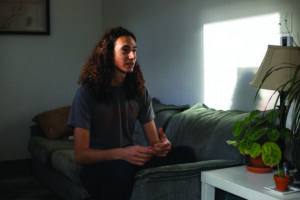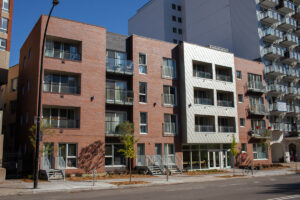After management woes and pandemic slowdowns, The Woodnote is beginning to take shape
After opening in 2020, The Woodnote Solidarity Cooperative has faced many challenges. The pandemic, a rotating door of board members, and a lack of training and guiding policy have made things difficult. However, as the pandemic slows down, along with a new student board elected on Oct. 17 and president elected on Nov. 5, things are beginning to change.
Sylvia Pascua-Matte joined The Woodnote’s co-op board in October 2020 and is the only remaining resident board member from that time, despite board members being elected for two year terms. She is now president of The Woodnote’s Solidarity cooperative’s board.
“I think that the [current] board has a lot of potential. I think that the board [members] are very confident people, and I love their work ethic and I love the project. But the project in itself is riddled with errors,” said Pascua-Matte.
The housing project is the first of its kind, intending to give students access to affordable, not-for-profit housing. Instead of just the usual landlord-tenant model, The Woodnote is a solidarity co-op, meaning it also has a board made of primarily volunteer tenants who help to manage community living within the building. The board consists of six seats for tenants and three for support members — one from UTILE, the other from the CSU and one representative from the Montreal community.
The three main groups who helped bring The Woodnote to life are UTILE, the not-for-profit housing company that designed, developed and owns the building; the CSU, who were the initial investors in the project, fronting almost two million dollars for its development; and the co-op’s board.
Before The Woodnote opened in summer 2020 a provisional committee of students was created to guide the developmental phase of the project, before passing things onto the board.
The co-op struggled in their first year due to an overwhelming lack of training, and balancing administrative tasks they felt unprepared for, like finding insurance for the building’s common room and creating the co-ops governing policy, while trying to foster a community.
“Nobody in the past provisional committee had even thought about [training]. There wasn’t proper onboarding, because everybody who was on the provisional board [left] and didn’t look back,” said Pascua-Matte.
One reason for the lack of support was that neither the CSU nor UTILE deemed it their responsibility to be involved in the student governance of The Woodnote. However, both groups hold support seats on their board.
“We don’t have any legal obligations to The Woodnote. There’s nothing on paper that ties us to The Woodnote other than this support member seat,” said CSU general coordinator Eduardo Malorni.
“The plan was never for the CSU to be the landlord of this building. The plan was never for the CSU to manage this building. The plan was never for the CSU to be involved in the day to day operations of the board. The plan for the CSU was always to be the initial investor, to allow this building to come to existence, and for the students within the building to really play the main role in managing their own building.”
A sentiment which UTILE executive director and co-founder, Laurent Levesque also shared.
“We handle our management partnership in all of the building operations. So all of the maintenance, rent collection, all of the baseline work to make sure people are safe and the building is well maintained is handled by our team of professionals,” explained Levesque.
“And then there’s the community living layer on top of that, which is handled by the co-op, which is led by students. And in that layer, we only play a support role.”
But it wasn’t just community living that the board was left to deal with.
Stephen Beker has been involved with the project since July 2019. He was a member of the provisional committee put in place prior to The Woodnote’s opening and is the former president of the board. He claims that the provisional committee put in place didn’t do enough to set the board up for success.
“We had meetings every week, and we tried to solve problems we weren’t equipped to solve. And we were tasked with making policy.” Beker said. “The problem is that the committee had no expertise.” Today, much of The Woodnote’s policy regarding finances, labour agreements, anti-opression, sexual assault and misconduct remain unfinished.
“The problem was that when people moved into The Woodnote, the building blocks were not built. As we speak today, the building blocks are still not built,” said Beker. “I would spend hours and hours on the phone, doing the most simple things like trying to get us a bank account.”
These issues have made it difficult for The Woodnote to cultivate its co-op identity, and students have noticed. Dylan Gitalis has been a resident at The Woodnote since it opened in 2020. He says his experience has been “very positive.” But, there are things he thinks it could do better.
“There’s definitely a good strong community here.” Gitalis said. “But it doesn’t really feel like a co-op, it feels like UTILE kind of owns it. It doesn’t feel like we have ownership over the building […] But, we’re still all people here so there is so much in our control in terms of the social dynamics and the culture.”

Even though the board is supposed to represent students living in the building, when residents have issues related to the building or their apartment unit they have to take them to the property manager employed by UTILE. This limits the board’s ability to represent students on these issues. Julia Belmore is a former woodnote resident who found it difficult to get help when she had problems with her apartment.
“Every time we brought up an issue, it kind of felt like it became our fault — like my fridge broke, and I wasn’t there and then all of a sudden, they were saying that we’re gonna have to pay for repairs. My apartment had no fridge for like a month in total.” Belmore said.
“But, if anything happened, it was on you to deal with.”
When applying to live at The Woodnote, students are asked what they can bring to the co-op . But, the pandemic and a lack of consistent access to their common room made planning these events difficult.
“Everybody has something they can bring, but nobody’s really doing it now unless you’re on the board and go through all these hoops,” said Gitalis.
“We can all run events that we’re talented at in the common room: someone can run yoga, we can all paint together. We can all do a jam session, and we can paint the stairwells, you know, and make our mark on it. […] That stuff to me means that this is our space, our cooperative. Right now it’s not.” Gitalis continued.
“We want to be a community together.”
Instability on the board also made running these events difficult. There was a very high-rate of turnover with board members consistently stepping down. Pascua-Matte was the only resident board member to return when the five new resident members were elected on Oct. 17. Former president Stephen Beker, who stepped down in October, had concerns that without stability and the removal of a great deal of institutional knowledge under a brand new board the co-op could fold. Something that neither UTILE nor the CSU have been worried about.
“The board is pretty much immune to folding.” Malorni stated. “Let’s say everyone left, every member of the board all decided not to show up. Someone could have gone to The Woodnote and been like ‘Hey, officially the paperwork [still says] that we’re a solidarity co-op. Can we organize a meeting and appoint a new board?’ An entire failure of the board will just result in one year of [a bad] experience, and then someone would restart the board and they would start fresh again,” Malorni stated. Levesque also shares this perspective.
“That’s the beauty of the model. If [the co-op folds] or decides to go dormant or dissolve by its own decision, it doesn’t have any impact on the building continuing its operations. The achievement of the goal of affordable housing is not directly tied to high-level student involvement.”
However, the co-op model is a big part of what makes the building unique, and it’s not something Pascua-Matte wants to see fail.
“To have them say if the board were to fail [it would be fine], that shouldn’t be in the realm of possibility. You’ve poured a [lot] of money into a project. That doesn’t mean you give it the option to fail. If you’re giving it the option to fail, then obviously it’s gonna fail.”
But UTILE said they are holding up their end of the bargain, and in many ways, The Woodnote has achieved many of its goals.
“Woodnote is a resounding success. I mean, they have newly constructed units at a very good price in a very good location and that’s the bottom line.” said Levesque.
“One of the things that The Woodnote does that deserves to be mentioned is the fundamental aspect of not trying to profit off of students,” said Levesque.
“Rents in the project increased by 1.5 per cent to follow inflation; but, rents on the plateau increased by 5 per cent, that non-profit approach to housing is important to make work in the short term. But, [it] has really important impacts in the long term, in ensuring affordable housing for future generations.”

To help get the co-op back on track after a rough first year, Malorni said the CSU is giving The Woodnote more attention by bringing in more experienced support members to give input on training and managing the board.
“I’m calling up people with board experience, who actually work in these sort of organizations to find someone willing to take up extra volunteer tasks of helping these people,” said Malorni. “I’ve been ensuring that pieces are joining the board which will ensure its success.”
“I’m playing a much more communicative role, which isn’t necessarily the role of the CSU to try and stabilize this board. We’re making sure that they do have the tools to succeed.”
While the CSU is trying to put more effort into supporting The Woodnote, Pascua-Matte still doesn’t feel she is seeing it enough and still feels the co-op’s concerns are being neglected and ignored.
“We would like to be properly supported and represented and what [they’re] doing right now is not representative of that.”
But as the pandemic eases, The board has finally been able to begin doing the community building it set out to do all along, the board is encouraging students to get involved and they’re responding by starting clubs and running events.
“We’re starting to work with different organizations that reflect what we want at The Woodnote. We are hoping to get some compost soon, […] we’re getting workshops done, like mandatory ones regarding anti-oppression and sexual violence.”
Now, with a new board of enthusiastic members some more training and hard work the student-run community can begin to take shape.
“People are seeing that the board is functioning, and we’re here and we’re supposed to represent you and they’re participating more and that’s what we want: participation,” said Pascua-Matte.
Pascua-Matte thinks The Woodnotes goals as a co-op are worth fighting for, and now with a more stable board they can begin to create a positive change and live up to the original promise of a student managed cooperative.
“Although there’s a lot of turmoil. I think that we can still follow the mandate that was originally given to us,” said Pascua-Matte. “I think the people on this board are willing to work for it.”
Feature graphic by James Fay and Catherine Reynolds




